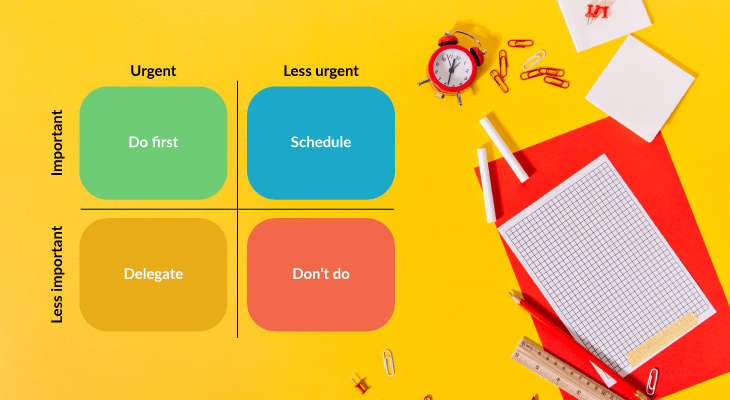7 Smart Strategies To Perform Better Under Pressure
Do you sometimes feel like you can never do well under pressure? We’ll let you in on some secrets on how you can excel in difficult situations.
Published 26 Jan 2021

As a student, you’re probably no stranger to being under pressure. From chasing assignment deadlines to surviving exam week, it can be a struggle to keep it all together when everything is piling up.
Here’s what you can do to excel and maintain your cool when you’re under pressure.
#1. Focus on the task instead of the outcome

It’s normal to constantly worry about the grades you need to achieve as you work through your pile of assignments. But this is simply a recipe for burnout.
The best way to work better under pressure is to slow down, stop mulling over the outcome of your work and focus on the task at hand instead. Make a checklist of what needs to be done and sort it out one by one. Developing a tunnel vision helps you strategise the necessary steps. If you have a paper to complete or a quiz to do, focus on running your research or studying for the quiz — not obsessing about what grades you’ll get.
Think of it as a “paint-by-numbers” approach. Not only will you be able to complete your work with ease but you’ll also likely get a good grade out of it from all the effort you put in.
#2. Anticipate the worst

Have you ever imagined all the worst-case scenarios that could happen right before presenting in front of the class? What if your presentation slides don’t show up correctly or you accidentally spill coffee all over yourself?
Overthinking elevates your stress levels and clouds your judgement — but there is a way to use this to your advantage.
Instead of merely worrying about the “what ifs”, expect the unexpected and mentally prepare yourself of the possibility that everything can go south. You’ll be less startled if something arises and instead of panicking, you’ll be able to maintain your composure and continue what you’re doing to the best of your abilities. The key is to not choke under pressure and ruin your effort.
Plus, with this in mind, you’re more likely to develop backup plans to make sure that things will run smoothly. This means charging your devices before class and emailing your slides to yourself beforehand just in case your pen drive doesn’t work.
#3. Focus on factors you can control

The truth is, there are many things in life that we can’t control, whether it’s other people’s thoughts, how they treat you or the fact that change is inevitable. In moments of pressure, focusing on things that are out of your control will only intensify the fear and increase your anxiety.
Instead of nitpicking your surroundings and other people, focus on the factors that you do have control over such as your attitude and reaction. For instance, say you’re teamed up with the laziest person in class. Instead of imagining catastrophic outcomes, find out how you can delegate the task to them without it affecting your grades. Learn to differentiate between ruminating and problem-solving so you won’t waste your time on unnecessary things.
You can also develop healthy affirmations that calm you down or motivate you to take action. Telling yourself that you can do it or that you’ll be okay can help you combat self-doubt and anxious thoughts.

#4. Use the Eisenhower model

Do you sometimes find yourself scrambling around trying to balance things on your plate? Perhaps you’re extremely busy but don’t feel like your work is up to par. Sometimes, multitasking is necessary but it can also be draining if it’s not done right.
Consider implementing the Eisenhower model into your work. Also referred to as the urgent-important matrix, this method will help you prioritise tasks based on urgency and importance, placing tasks that are inessential for later. The model consists of four categories — urgent and important, important but not urgent, urgent but not important, neither urgent nor important.
List down all the things you have to do, regardless of how unimportant they are and then place them in each category where you see fit. Keep in mind to avoid listing all the tasks as important. You can also sort them by dates to have a clearer picture on the urgency of each task. This way, you can see which ones require your attention and which can be delayed or delegated.
Apply for university with EduAdvisor
Secure scholarships and more when you apply to any of our 100+ partner universities.
Start now#5. Use your past success as a learning tool

You may think that certain tasks are difficult to handle but remember that you’ve overcome more obstacles before, even when you thought you couldn’t. Remembering your past successes is a good motivator to keep you going.
While what you’re managing now may not be the same as before, the intensity of being under pressure is. Consider reviewing past pressure points and identify what you’ve learnt before developing a new strategy that can prevent recurring problems. Essentially, you’re learning from what you’ve done right previously to improve your method of handling situations.
Plus, reminiscing your past success can make you feel more confident about yourself and ultimately help you combat your anxiety.
#6. See a challenge instead of a threatening situation

So often people see high-pressure situations as threatening, fearing that they’re unable to succeed. This fear of failure can cause lack of confidence, bad judgement and can lead to procrastination. But it doesn’t have to be that way.
Try shifting your perspective and see this as a fun challenge to tackle instead of an obstacle to overcome. By doing so, you’re stimulated to give the project your utmost attention and energy. This means you can also relax, take control and strategise your plans better.
Take this as an opportunity to grow and prove to yourself that you are capable and efficient of overcoming high-pressure situations. Remember that if you can do this, you can do anything.

#7. Vent your feelings to someone you trust

Stress and pressure can intensify even more when you bottle it up. According to psychologists, sharing what you’re feeling can help you reduce stress levels and ultimately, feel much better.
When you’re feeling overwhelmed or stressed out, open up to a groupmate if it’s college-related or someone you trust in general. Not only will the process be cathartic, but having someone who understands what you’re upset about or going through can help you feel heard and validated. In fact, you may not be the only person feeling this way. As you vent, there’s a good chance that they can also relate with you, which makes them feel less alone.
To boot, sharing your feelings opens a room for a third-person point of view of your problem. Hearing their feedback about it can help you get out of the tunnel vision and examine the issue in a more realistic manner — feedback that you may not have thought about.
Everyone’s experience of being under pressure is unique. But when you’re hard on yourself often, it can feel like you never do well under pressure. But in reality, it’s as simple as changing your perspective from fear into optimism.






